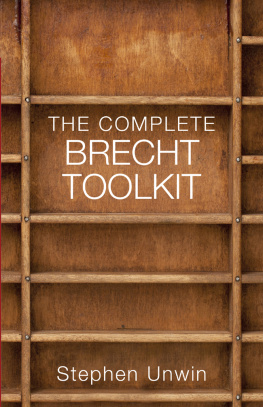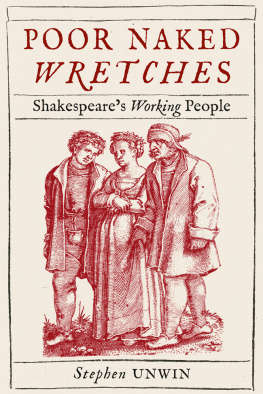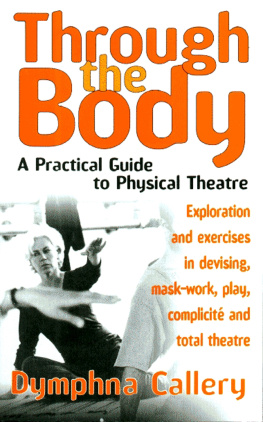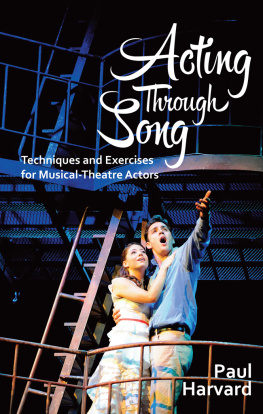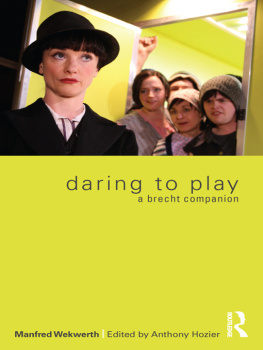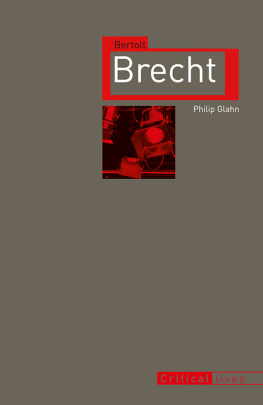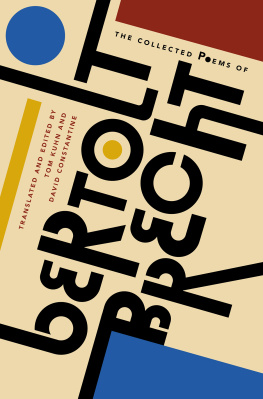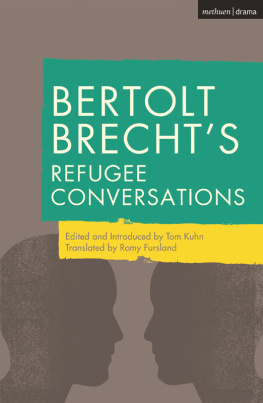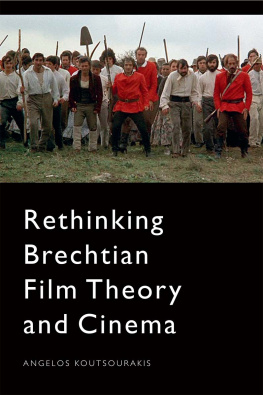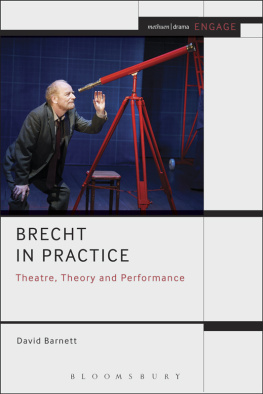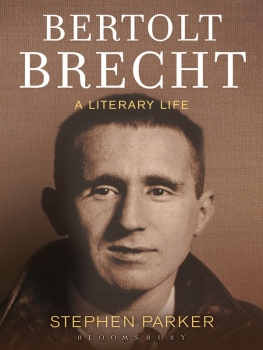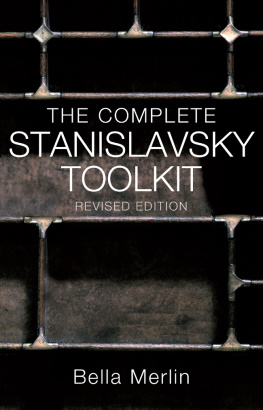The Complete
Brecht Toolkit
STEPHEN UNWIN
with Julian Jones

NICK HERN BOOKS
London
www.nickhernbooks.co.uk
For our London season we need to bear two things in mind. First: we shall be offering most of the audience a pure pantomime, a kind of silent film on the stage, for they know no German. Second: there is in England a long-standing fear that German art must be terribly heavy, slow, laborious and pedestrian.
So our playing needs to be quick, light, strong. This is not a question of hurry, but of speed, not simply of quick playing, but of quick thinking. We must keep the tempo of a runthrough and infect it with quiet strength, with our own fun. In the dialogue the exchanges must not be offered reluctantly, as when offering somebody ones last pair of boots, but must be tossed like so many balls. The audience has to see that here are a number of artists working together as an ensemble in order to convey stories, ideas, virtuoso feats to the spectator by a common effort.
Good work!
Bertolt Brecht
Brechts last message to the members of the Berliner Ensemble (5 August 1956). He died nine days later, on 14 August. The Ensembles London season opened on 27 August, with Mother Courage.
Contents
Acknowledgements
Brecht had dozens of collaborators and for the most part acknowledged them. I have fewer, but they deserve credit too.
The late John Willett (19172002) recognised that if you have a reasonable grasp of history, a sceptical approach to theory and a robust sense of humour, its possible to appreciate Brechts remarkable achievements. I refer to his and Ralph Manheims (190792) editions of the Collected Works Their translations of Brecht have been much criticised but until someone supplants their editions in ways that are true to the plays, in tune with Brechts intentions and scholarly in their approach, John and Ralph (ably supplemented by Tom Kuhn in recent years) will bear the palm as Brechts most significant British champions.
The eight volumes of the Methuen Collected Works is one of the most lavish compliments paid to a foreign playwright by a British publisher and Im grateful to Methuen and the Brecht Estate for granting permission to quote from these superb editions. But none of it would have been possible without Nick Hern, the most knowledgeable of theatrical publishers, and long champion of Brecht. His friendship over twenty-five years has meant a great deal to me, and Im particularly grateful to him for not losing patience with my many delays in delivering this book.
I owe Julian Jones and his excellent students from Rose Bruford College a debt of gratitude for devising the fifty practical exercises in directors and others with whom Ive explored the practical application of Brechts theory.
I especially treasure my collaborations with Tilda Swinton in the 1980s: we tried to understand Brechts theatre by doing it, not by studying the theory. The great Marxist literary critic and teacher Margot Heinemann (191392) was our guiding light; but, as Brecht was so fond of quoting, The proof of the pudding is in the eating.
*
The author and publisher acknowledge permission to quote extracts from the following:
Brecht on Theatre Bertolt Brecht, edited and translated by John Willett. Translation copyright 1964, renewed 1992 by John Willett. Reprinted by permission of Hill and Wang, a division of Farrar, Straus and Giroux, LLC in the United States of America, and Methuen Drama, an imprint of Bloomsbury Publishing, in the rest of the world.
Collected Plays, Poems, Letters and Journals Bertolt Brecht. Translated and edited by John Willett, Ralph Manheim and Tom Kuhn. Reprinted by permission of Methuen Drama, an imprint of Bloomsbury Publishing.
Methuen have published eight volumes of The Collected Plays. |
Poems 19131956 (1976); Poems and Songs from the Plays (1990). |
Letters 19131956 (1990). |
Journals 19341956 (1993). |
Brecht on Theatre (1964); Brecht on Art and Politics (2003); Brecht on Film (2001); and The Messingkauf Dialogues (1965). |
The following graduates from the Rose Bruford Acting and Actor Musician Programmes took part: Dan Dingsdale, Josie Dunn, Maddy Hill, Max Hutchinson, Gill Mackie, Alex Mugnaioni, Kirsty Oswald and Huw Parmentor. |
| In an obituary, Margot Heinemanns lifelong friend and fellow Communist, Eric Hobsbawm, described her as one of the most remarkable people of our time and a testament to its indestructible hopes. I owe many of the insights in this book to her example. |
The Complete
Brecht Toolkit
Introduction
B ertolt Brecht (18981956) was one of the greatest play-wrights of the twentieth century. He was also a prodigiously talented stage director whose work has had a huge impact on the development of the modern theatre.
His approach is still significant, as the director Peter Brook has acknowledged:
Brecht is the key figure of our time, and all theatre work today at some point starts or returns to his statements and achievements.
Even in his lifetime, however, Brecht was widely misunderstood. This is partly his own fault: his views were frequently contradictory and he could be wilfully obscure. And he was exceptionally fertile: A man with one theory is lost, he joked. He must have several, four, many! But its above all because his ideas have been so widely appropriated that its hard to separate Brechts own views from those of his later imitators and interpreters.
The aim of this book is to clear away some of the mystery that surrounds Brechts theatre and explain what he was trying to do. If I express impatience with theory, its because I subscribe to Brechts favourite phrase from Hegel: The truth is concrete. And because I know, as a director and teacher, that the best I can offer is rooted in practical experience.
In approaching Brecht, we must be careful to avoid what E.P. Thompson called the enormous condescension of posterity. For Brechts innovations cannot be understood without a feel however rudimentary for the political, social and cultural conditions of his time. We should perhaps bear in mind the following four points:
Brecht devised his theatrical style as a way of engaging with the world in which he found himself, what he memorably called the dark times, and we cannot appreciate the first unless we accept its intimate connection with the second. |
Brecht didnt intend his work to be applicable at all times and places, and refused to set in stone things that were intended to be provisional, and so its essential that we approach his work historically, as the product of a particular time and place. |
Brecht experimented with many different voices sometimes mischievous, at other times provocative, and frequently ironic and its a mistake to look for a definitive statement of his views; instead, we should assemble our insights from as wide a range of sources as possible. |
Brecht emphasised change, above all: not just the political change that he wanted to bring about, but the great tides of change that make up human history. The world and the theatre has changed enormously in the half-century since his death, and any modern understanding of his work must embrace that fact. |
In other words, if we are to understand Brechts theatre, we need to engage with Brechts unique personality and the very different world in which it emerged. To do anything else would be thoroughly un-Brechtian.
Next page
